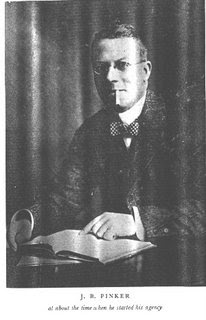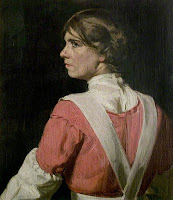Saturday, March 12th., Fulham Park Gardens, London.
On my way to seeing Mrs. L. I called at a bread shop in Holborn. To judge from the exterior one could desire no place of refreshment more fastidiously neat and dainty. But when I was inside I found the shop and the room at the back occupied by women and girls in various conditions of
deshabille. The place was being cleaned, and the hour being only 11 a.m. customers were clearly not expected. The girls all looked up surprised, and with a show of indifference I picked my way amongst kneeling figures into the inner room. When I had sat down, I heard a rummaging noise under the table, and presently a fat young girl appeared therefrom. She hurried away laughing, but came back shortly and produced from under the table a tin bowl of dirty water which she carried away, with a giggle. I ordered a glass of milk and a sandwich, and then waited. A girl, tall, thin and vacuous, ran upstairs and came down soon afterwards pinning on an apron at the back. She brought me my food. I ate it, while looking at a dirty newspaper placed to protect the newly washed floor, and at the crimson petticoat showing through the placket-hole of a girl who was washing the floor behind the counter. I could feel about me the atmosphere of femininity. The dirt and untidiness spoilt the taste of my food, and I thought: "This is a bad omen for the result of my interview with Mrs. L."
The room into which I was shown in Gower Street was, I think, the ugliest, the most
banal I have seen. From the twisted columns of the furniture to the green rep of the upholstering, everything expressed Bloomsbury in its highest power. This was a boarding house. My hopes sank and they were not raised by the appearance of Mrs. L. who combines the profession of a landlady with that of a "mental healer". She looks the typical landlady, shabbily dressed, middle-aged, and with that hardened, permanently soured expression of eyes and lips which all landladies seem to acquire. She fitted with and completed the room.
She asked me about my stammering and my health generally, talking in a quiet, firm, authoritative voice. I noticed the fatigue of her drooping eyelids and the terrific firmness of her thin lips. She told me how she had been cured of nervousness by Dr. Patterson of America, and gave a number of instances of his success and her own in "mentally treating" nervous and physical disorders. Some of them were so incredible that I asked myself what I, notorious as a sane level-headed man, was doing in that galley. However as Mrs L. talked I was rather impressed by her sincerity, her strong quietude, and her sagacity. I asked what the patient had to do. "Nothing", she said. I explained my attitude towards "mental healing" - that I neither believed nor disbelieved in it, that certainly I could not promise her the assistance of my 'faith'.
"Can you cure me of my stammering?"
"I am quite sure that I can," she answered with quiet assurance, "but it will take some time. This is a case of a lifelong habit, not of a passing ailment."
"Shall you want to see me often?"
"I shall not want to see you at all: but if you feel that you want to see me, of course you can do so. I shall look after your general health too. If you have a bad headache, or a liver attack, send me a word and I will help you."
I nodded acquiescence but I was nearly laughing aloud, and telling her that I preferred to dispense with these mysterious services. As I was arranging terms with her, I marvelled that I should be assisting at such an interview. And yet - supposing there were after all something in it! I was not without hope. She had distinctly impressed me, especially by odd phrases here and there which seemed to indicate a certain depth of character in her. I went away smiling - half believing that the whole thing was a clever fraud, and half-expecting some happy result.
Tonight I sent her a cheque. I wondered, as I wrote it out, whether twelve months hence I should be wanting to burn these pages which recorded my credulity, or whether with all the enthusiasm of my nature I should be spreading abroad the report of Mrs. L's powers.



























